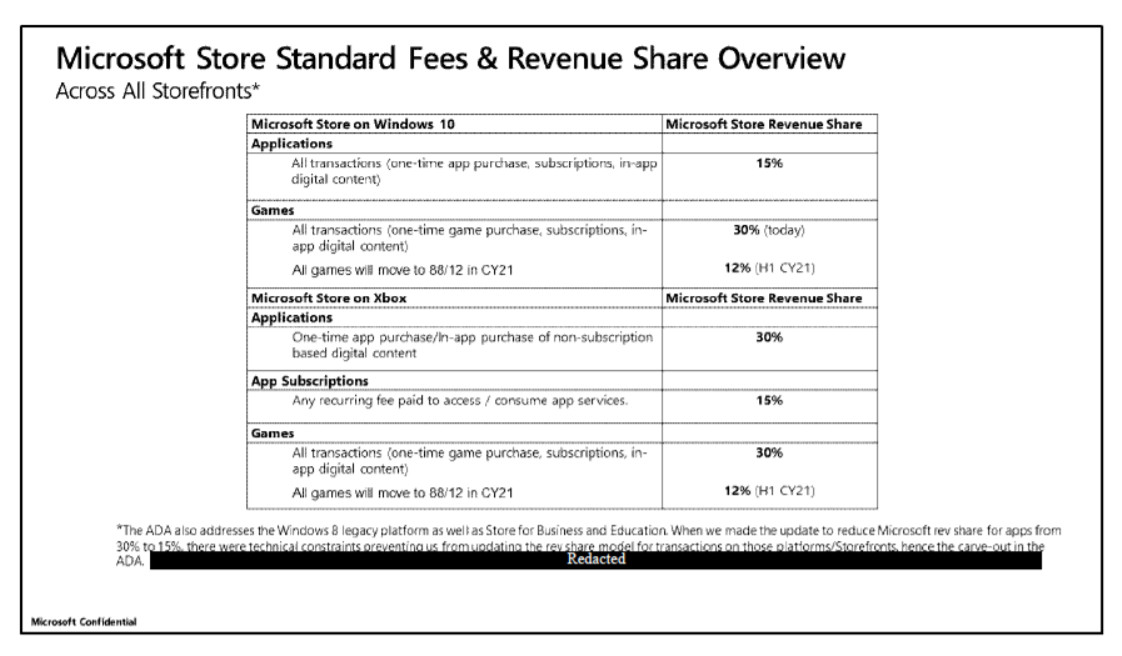Microsoft had been planning to cut its Xbox store cut to just 12 percent, according to confidential documents filed in the Epic Games vs. Apple case. The software maker details its store fees and changes in a document from January, where it also lists the 12 percent cut to PC games it announced this week. While most of the important parts of the document are redacted, one page reveals Microsoft also wanted to reduce its 30 percent store cut on the Xbox console side.
A table reveals “all games will move to 88 / 12 in CY21,” which means Microsoft had been planning a significant cut to Xbox transactions for some point in the 2021 calendar year. While Microsoft has announced its PC cut, which is also listed in the same table, the company has stayed quiet about any Xbox plans. A change to 12 percent would be significant, particularly because Microsoft, Sony, and Nintendo all currently take 30 percent on digital game sales.
:no_upscale()/cdn.vox-cdn.com/uploads/chorus_asset/file/22486068/TVaAAxV.png)
A Microsoft spokesperson initially said “we have no plans to change the revenue share for console games at this time,” in a statement to The Verge on Saturday, before issuing a clearer statement on Sunday.
“We will not be updating the revenue split for console publishers,” says a Microsoft spokesperson. Microsoft still refuses to answer whether the document is inaccurate, or simply that plans changed.
This document is part of the Epic Games vs. Apple trial that commences on Monday, and there could be questions over Microsoft’s fee plans here. Both Epic and Apple are calling on Microsoft’s Lori Wright, VP of Xbox business development, as a third-party witness next week.
The documents also reveal that Microsoft had been planning to adopt this lower store rate on the PC side with an important caveat. “There is a proposal currently under Gaming Leadership Team consideration to adopt 88 / 12 as a public PC games revenue share for all games in exchange for the grant of streaming rights to Microsoft,” reveals the document. We asked Microsoft whether this proposal went ahead, but the company refused to comment in time for publication. Microsoft is planning to cut its share of revenue for PC games to 12 percent in August, but it’s not clear if the streaming rights clause is still included.
:no_upscale()/cdn.vox-cdn.com/uploads/chorus_asset/file/22486069/QRSIzcT.png)
The streaming rights clause would mean developers have to ensure games are available on xCloud for this improved revenue cut. Cloud gaming rights, and in particular Xbox Game Pass, have becoming an emerging battle ground for console exclusivity rights in many contracts recently. Nvidia also generated pushback from publishers and developers after publishing some games to its GeForce Now cloud gaming service without permission.
As we noted yesterday, Microsoft has also been quietly backing Epic Games’ action against Apple. Microsoft has previously defended its 30 percent cut for Xbox digital game sales, and Epic Games has been happy to keep it in place. “Game consoles are specialized devices optimized for a particular use,” said Rima Alaily, deputy general counsel at Microsoft, last year.
Alaily argues that the “business model for game consoles is very different to the ecosystem around PCs or phones,” because Microsoft subsidizes the hardware and consoles “are vastly outnumbered in the marketplace by PCs and phones.” An Epic Games executive also revealed in a court deposition this week that the company has never sought to negotiate with Microsoft to avoid using its commerce engine on Xbox. Despite defending its Xbox cut, Microsoft did admit last year that the company has “more work to do to establish the right set of principles for game consoles.”
Elsewhere, another confidential document shines a light on exclusivity with Xbox games. S.T.A.L.K.E.R. 2 is listed with a three-month console exclusivity deal, Tetris Effect: Connected with six months of exclusivity on connected updates, and The Gunk with perpetual exclusivity to Xbox.
:no_upscale()/cdn.vox-cdn.com/uploads/chorus_asset/file/22486070/G6ckBUj.png)
Update, May 2nd 6:50AM ET: Article updated with additional streaming rights details.
Update, May 2nd 3:50PM ET: Article updated with new comment from Microsoft that makes it clear this cut is no longer happening.
